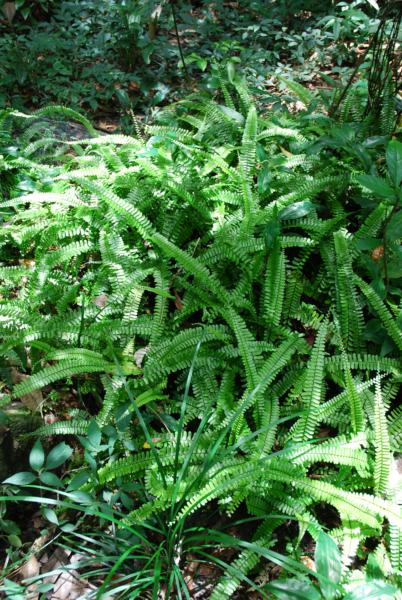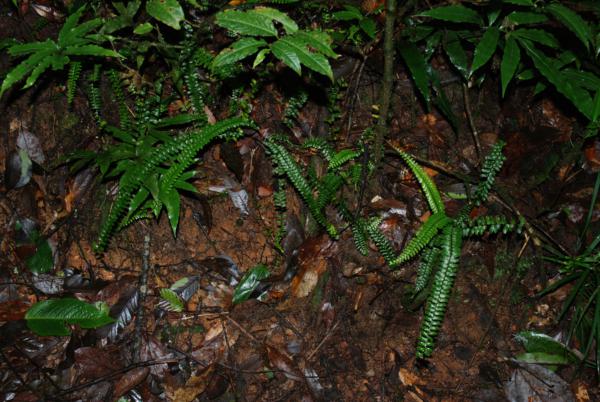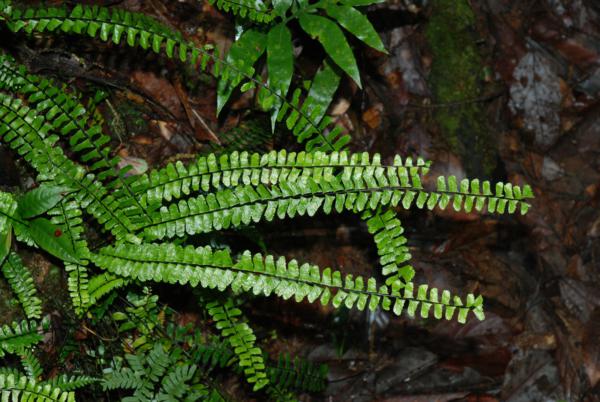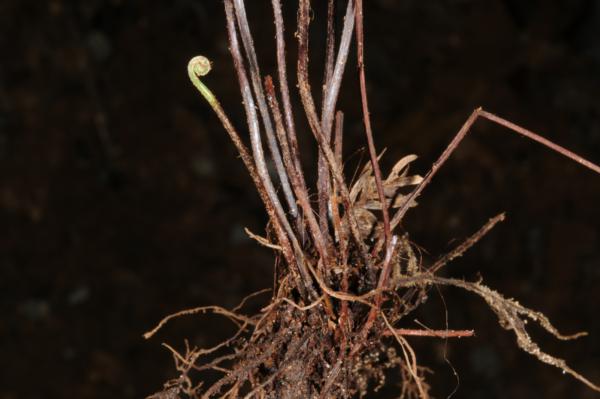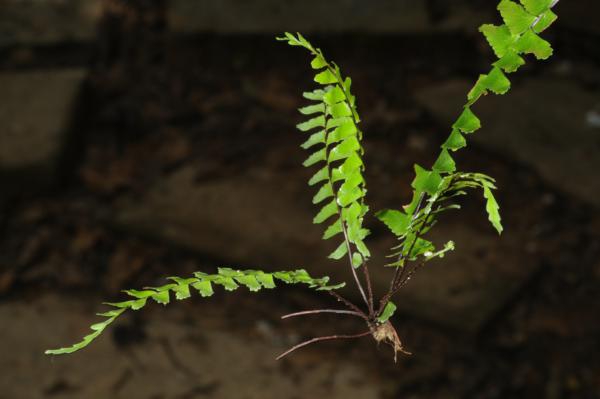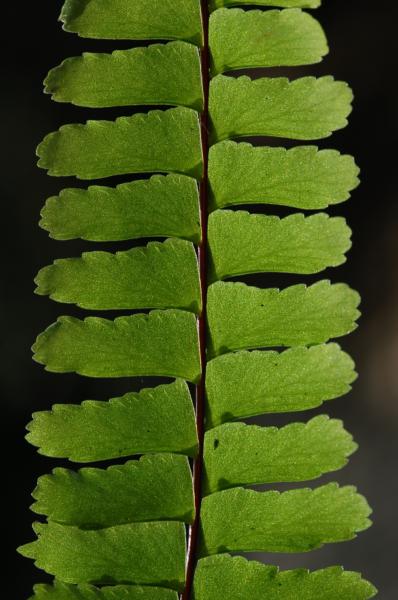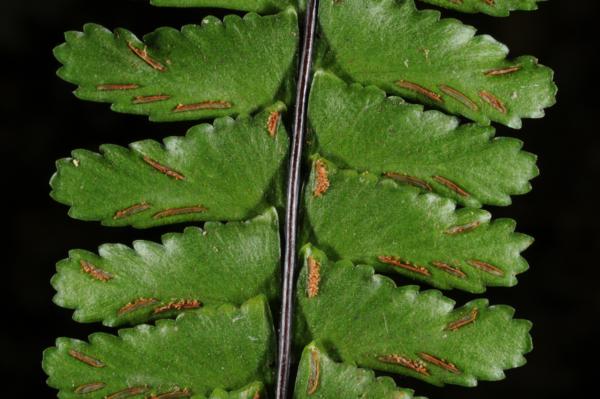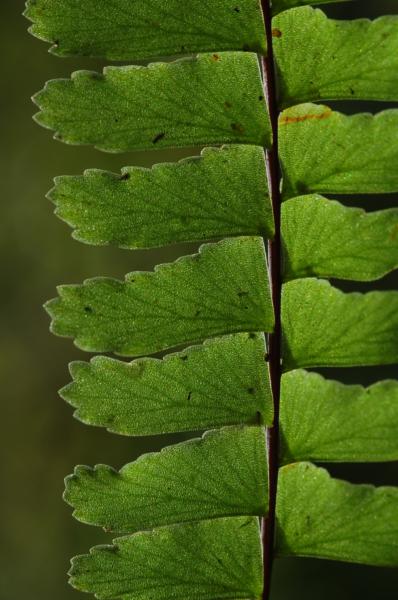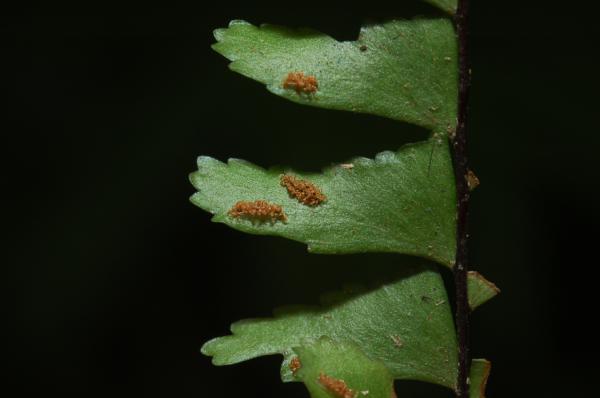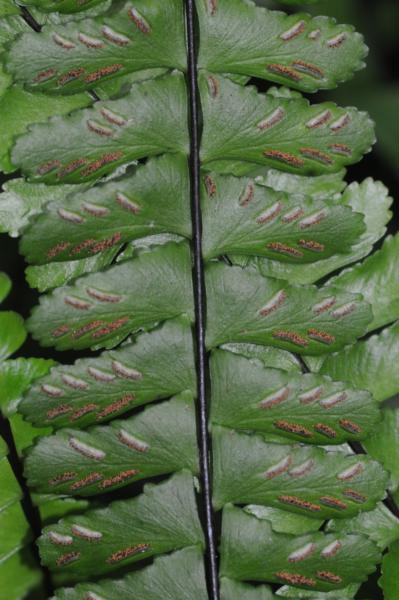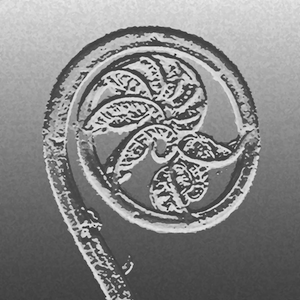
Asplenium normale D.Don
Family
Aspleniaceae
Nomenclature
Asplenium normale D.Don, Prodr. Fl. Nepal.: 7. 1825; Bedd., Handb. Ferns Brit. India: 144. 1883; Tardieu & C.Chr., Fl. Indo-Chine 7(2): 225. 1940; Holttum, Rev. Fl. Malaya ed. 1, 2: 436, f. 254. 1955 [‘1954’]; Holttum, Dansk Bot. Ark. 20: 28. 1961; Holttum, Dansk Bot. Ark. 23: 236. 1965; Tagawa & K.Iwats., SouthE. Asian Stud. 5: 8. 1967; Tagawa & K.Iwats., Fl. Thailand 3: 280. 1985; Boonkerd & Pollawatn, Pterid. Thailand: 111, 112, 143. 2000; Newman et al., Checkl. Vasc. Pl. Lao PDR: 25. 2007. – Type: Buchanan-Hamilton, Nepal, Narainhetty (holotype BM, Morton photograph 6675).
Description
Terrestrial, lithophytic or epiphytic. Rhizome short, erect, scaly; scales gradually narrowing from base towards hair-pointed apex, up to 4 by 0.7 mm, bicoloured, the central portion black, with longitudinal cells, the edges brown to dark brown. Stipes very deep castaneous to nearly black, more or less polished, up to 15 cm long, usually about 10 cm long, grooved with two low but distinct ridges on adaxial surface. Laminae lanceolate to narrower, pinnate, slightly narrowing at base, gradually narrowing upwards, caudately acuminate at apex, up to 50 by 4.5 cm; rachis wingless throughout, viviparous; lateral pinnae up to 57 pairs, sessile, patent or slightly reflexed, oblong, rounded at apex, lobed to 1/5 way on both margins, narrowly cuneate at basiscopic base, auricled and truncate at acroscopic base, about 20 by 6 mm; midrib rarely viviparous; veinlets simple or forked, not running to the very top of lobes. Sori up to 3 mm long; indusia thin.
Distribution in Thailand
NORTHERN: Mae Hong Son, Chiang Mai, Phitsanulok; NORTH-EASTERN; Phetchabun, Loei; SOUTH-WESTERN: Phetchaburi; CENTRAL; Nakhon Nayok; SOUTH-EASTERN: Chanthaburi; PENINSULAR: Krabi, Nakhon Si Thammarat, Songkhla.
Distribution in Laos
Champasak, Hua Phan, Khammouane, Luang Phrabang.
Distribution in Cambodia
Kompong Chhnang.
Wider Distribution
Old World tropics throughout, north to Himalaya and Japan.
Ecology
Terrestrial on rather dry slopes, humus-rich slopes or on Sphagnum-bog, on wet muddy rocks or in crevices of cliffs, or on mossy basal tree-trunks in lower montane forests usually at above 1000 m altitude.
Proposed IUCN Conservation Assessment
Least Concern (LC). This species is widespread and not under any known threats.
Voucher specimens - Thailand
Maxwell 00-399, Nakhon Nayok (CMU); Middleton et al. 4891, Chiang Mai, Doi Inthanon National Park (E); Middleton et al. 5086, Phitsanulok, Phu Hin Rong Kla National Park (E).
Voucher specimens - Cambodia
Poilane 28782, 28786 & 28810, Kompong Chhnang, Phnom Chom (P).
Habit
Habit
Fronds
Rhizome, crozier and stipe bases
Bulbil at frond apex
Upper surface of frond
Lower surface of lamina and sori
Venation
Sori
Sori
Site hosted by the Royal Botanic Garden Edinburgh. Content managed by Stuart Lindsay, Gardens by the Bay, Singapore and David Middleton, Singapore Botanic Gardens. Last updated 24 January 2012
